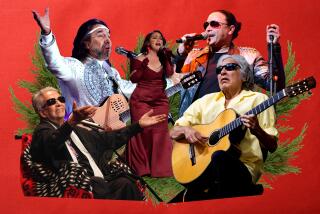Mardi Gras music: A New Orleans playlist for the rest of us
- Share via
It’s Mardi Gras in New Orleans. Bloody Marys are being downed before breakfast. Bands are on the march, revelers on the revel. Nobody’s at work but the cops and the jailers down at Central Lockup, waiting for this year’s crop of knuckleheads who let their bon temps rouler beyond even the generously stretched bounds of decorum that the day provides.
For the rest of us, it’s just Tuesday. To dull the pain, here is a quick-and-dirty Mardi Gras 101 playlist:
First up is the late piano genius Professor Longhair with “Go To the Mardi Gras.” The lyrics read like a Fodor’s Guide entry set to Fess’ shuffling mambo-rumba-boogie beat. Play it in your cubicle and mourn the fact that you didn’t have a ticket in your hand.
Professor Longhair, born Henry Roeland Byrd, died in 1980. He was never a big star in his lifetime, though he is worshiped worldwide by R&B cultists, and locally is considered the city’s musical patron saint.
His “Big Chief Part I and II” is one of the most powerful Mardi Gras anthems, with an insistent, funky beat and lyrics sung from the perspective of a chief of the Mardi Gras Indian tribe, the African American revelers whose beaded suits and insular chanted patois have been explored with nuance and feeling in David Simon’s “Treme” miniseries on HBO.
The Indians, often in collaboration with New Orleans session musicians, have produced a full body of infectious, strange, beautiful music. The Wild Tchoupitoulas’ self-titled 1976 album is considered a cornerstone of the genre, with the tribe backed up by New Orleans’ most important funk combo, the Meters, including keyboardist Art Neville, who is joined by on the recording by famous brothers Aaron, Cyril and Charles.
“Hey Hey” is not the best-known song of the record, but it gives a good sense of a joyous music that is shot through with menace: Bluster and boasting and intimations of violence have long been part of the Indians’ mystique — fitting for a tradition that may have roots in Native American and African alliances against oppressive white colonialists, and perhaps even in the popularity of Buffalo Bill’s Wild West Show, which came to New Orleans in 1884.
All of that theorizing goes out the window when the party starts, of course, and locals have a special fondness for “Carnival Time,” a 1959 single by the R&B singer Al Johnson, with a lyric that refers to a couple of defunct nightclubs of the era, and summarizes the wild and carefree spirit of the day:
The Green Room is smoking
And the Plaza’s burning down
Throw my baby out the window
Let those joints burn down
All because –
It’s Carnival time!
ALSO:
Fat Tuesday: It’s your last hurrah, folks
Presidents Day reality check: Lincoln was robbed
John Glenn chats with space station on 50th anniversary of orbit
More to Read
Sign up for Essential California
The most important California stories and recommendations in your inbox every morning.
You may occasionally receive promotional content from the Los Angeles Times.













